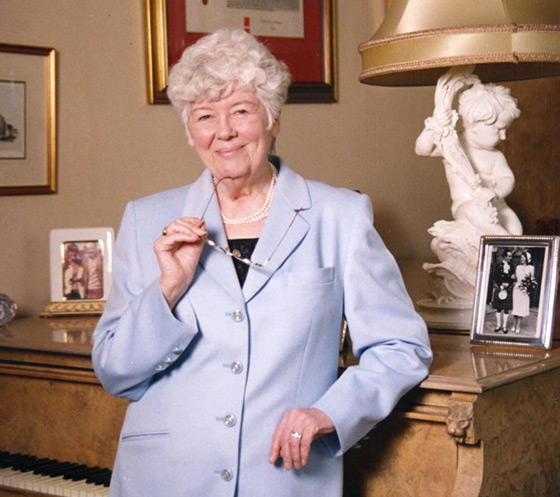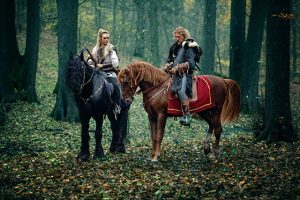
‘Ian Fleming was a friend of ours and he told me he was going to write a novel about “a spy to end all spies” and he went ahead and created James Bond, and I decided, ‘Right, then, if he can do it, so can I! I am going to create the hero to end all heroes’.
Dorothy Dunnett, Sydney, 13 March 2000, telling me about how the character of Lymond came into being.
And that was how Dorothy Dunnett (1923–2001) described to me the beginning of her journey to become a best-selling diva – and a historical novelist to end all historical novelists!
Back in 2000, she was visiting Australia for the first time – a guest of the Adelaide Writers’ Festival – but there was little publicity about her visit in the Australian press and only a fraction of her fans found out that she was visiting.
‘I have waited decades for a chance to meet her,’ exclaimed one of her ardent admirers, Bantam historical novelist Cheryl Sawyer, as she joined the book signing queue.
I’d waited decades, too, and I was delighted that Dorothy was willing for me to interview her. I did not know what to expect, a formidable Lady Dunnett, encrusted with British reserve? Or a Judi Dench MI5 chief-type? I was wrong on both counts. The woman who arrived to be interviewed proved to be a friendly Scot, astute but gentle, stylish yet understated in her appearance, grandmotherly, cheerful and unrushed. A sprightly, seventy-six year old who looked much younger than her age.
Over her writing career, she had completed a series of six mammoth novels, set in the sixteenth century, following the adventures of Francis Crawford of Lymond, a young, golden-haired, Scottish nobleman. She had also written six contemporary spy novels, and when I met her, the seventh and final novel of her House of Niccolò series (the adventures of Nicholas de Fleury, a Flemish merchant of the mid-late fifteenth century) was in press.
Her ideal hero – charismatic Lymond (pronounced Lie-mond) came to birth on an Olivette typewriter in the 1950s. She told me he had proved to be ‘a difficult creature, articulate, mercurial, charismatic’ but she had planned to follow his ‘star-crossed career – disturbing, hilarious, dangerous’ through ten years of his life.
She explained it was not just Ian Fleming who had provoked her to become an author.
‘I never had the desire to write particularly, but I married the right man. You see, I started complaining to my husband that I could not find the sort of books I wanted to read. I’d enjoyed authors like Dumas, Sabatini and Orczy. I’d read the Hornblower series and all of Georgette Heyer’s Regency novels. I just ran out of authors. ‘Why not write your own?’ said my husband. ‘But make it a series. Publishers prefer that.’
Dorothy started doing the research for the Lymond series at the National Library, Edinburgh, and she was later to become a member of its Board of Trustees. She made notes painstakingly by hand. There were no photocopiers, no faxes, no emails to distant libraries and no world wide web with on-line copies of historical records that could be easily downloaded.
Halfway through the first draft of her first book, she stuck a hesitant toe in the literary water and posted the mss to Hutchinson. Impressed, they sent the already bulky parcel out to their reader. ‘Whatever happens, you must publish this book,’ came the reply. Offers arrived from several publishers, but always with the proviso: ‘only if the book is shortened.’
Dorothy, already a success as a portrait painter with exhibitions in the Royal Scottish Academy, was not sure if she could be bothered to continue writing. It was then that Lois Cole (the editor who had persuaded Margaret Mitchell of GONE WITH THE WIND to change her heroine’s name from Pansy to Scarlett), rode in. Cole masterminded the cuts and steered the manuscript to the right publisher. Dunnett’s first book THE GAME OF KINGS was published in America then England. That was in 1961.
As Lymond’s adventures moved from Scotland to Catherine de Medici’s France and on to the Mediterranean and the intrigues of the Knights of St John, Dorothy travelled as well, covering a great canvas. Her fourth novel PAWN IN FRANKINCENSE took her main characters to the court of Suleiman the Magnificent. By then she had truly found her author’s voice and her hero had met his match in two people: his enemy, Graham Malett (Gabriel) and the feisty and clever young English girl, Phillippa Somerville. For me, the scene at the Turkish court where the enmity between the two men culminates in a deadly game of chess with living pieces was stunning, the tension extraordinary.
With 22 books between 1961 and 1998, how did she manage such an output?
‘It takes me about fourteen month to complete one of the Niccolò books. In the morning I usually deal with correspondence and any business to do with all the committees I’m on. I read up all my history notes relevant to the chapter that I’m working on and then I sit down at the keyboard, usually doing 2500 words at a sitting, and I’ll often work until five in the morning.’
CAPRICE & RONDO, her most recent publication when I met her, was a hefty 559 pages with a cast of 188 named characters, let alone the rest. That was typical.
Setting her own rules
Dorothy’s historical novels broke the by-laws doled out to wannabe writers – there were no simple concepts, no economy of description, no talking down to the reader. Instead, she demanded cerebral dexterity from her fans as she whizzed them through intrigue within intrigue. I told her I reckoned that like King Henry VII, she had ‘a corkscrew mind’ and she laughed, fully agreeing.
As for character viewpoints, again she had her own rules and that is what made her heroes so special. Often you witness Lymond or Nicholas in action but you do not always know what they are thinking unless they tell you. It is more often through the eyes of the friends and associates who cluster round them, like worker bees around the sovereign of the hive, that you see what is happening.
There are some rules that Dorothy did follow. She knew a good hook works: ‘Not to every young girl is it given to enter the harem of the Sultan of Turkey and return to her homeland a virgin.’
So begins THE RINGED CASTLE, the fifth Lymond novel.
The fresh, apt phrases, the wonderful narrative poured forth in the early hours. Dorothy was not an author who spiced in the details in a later draft, she always got it right first time.
‘How do you remember if you have used a particular metaphor already?’ I asked her.
‘Ah,’ she answered, ‘that is where I rely on my copy editor to tell me if I have repeated an adjective or used a similar description before.’ She also admitted she always sent half the latest manuscript to the editor before she had finished the total draft. A practice that would terrify some authors.
Her style was underlined with humour. No question, either, that her portrait painter’s skill carried to her novels. It was the quirky details that could lift the whole – the body language, the aspects of personality that needed to be noticed and the importance of the background – the fine brush strokes that make her descriptions and characters so memorable.
Her gasp of history was phenomenal, the details trustworthy, and the renaissance world she recreated with its merchants, mercenaries and potentates showed an understanding of international trade and politics that many a modern diplomat might envy.
Did you ever employ researchers?
She told me she did most of it herself.
‘My notes for my early novels are in ledgers. My studio is lined with bookcases. I buy a huge number of reference books and I subscribe to about twenty periodicals so I can keep myself informed about what is available. I realize now why few writers have tackled sixteenth century history. It requires a huge amount of effort.’
Macbeth
She wrote one stand-alone historical which stepped outside the familiar 1460-1558 territory – her novel on Macbeth, KING HEREAFTER, published in 1976 before she began the Niccolò series. She never returned to this earlier period.
‘Had changing eras taken too much time? Was this a mandatory book?’ I asked her.
‘The publishers suggested that I tackle a famous Scots historical figure: Mary, Queen of Scots, Bonnie Prince Charlie or Macbeth. Well, no one had dared to challenge Shakespeare, so I decided on Macbeth. The research took five years and there were very few sources, so I used a lot of recent archaeological information and I came up with some radical conclusions on Macbeth’s identity that changed the history books.’
Had she ever thought of turning herself into a historian like Dorothy Tuchman, author of A DISTANT MIRROR and THE MARCH OF FOLLY?
‘Yes,’ she answered, maybe one day she would write up her findings on Macbeth in a non-fiction format. ‘Don’t forget I have my Johnson Johnson books as well,’ she reminded me.
Yes, she also had six novels with a modern hero, an intelligence agent and well-known painter of portraits who wore bifocals, owned a Mayfair apartment and a yacht called Dolly. ‘I have difficulty keeping up to date with the research. As soon as I get used to the layout and equipment of my hero’s latest yacht, a new model comes onto the market and I have to research that.’
I could imagine her enjoying that, the silver cap of curls tousled by the sea wind. Not bad for a seventy-six year old. ‘The publishers were worried I might die before the final Niccolò novel was finished. I had to give them a summary in case something happened to me.’
And her fans needed satisfaction. She told me that her American devotees produced a quarterly correspondence magazine that was euphemistically called M and K (it began as ‘Marzipan and Kisses’, her description of Catherine de Medici’s court in QUEENS’ PLAY.) The English letterzine preferred to call itself Whispering Gallery. Then she told me there was Elspeth Morrison’s THE DOROTHY DUNNETT COMPANION (published by Michael Joseph) which translates the poetry quoted by Lymond and offers raunchy enlightenment on the hero’s Latin swear words.
The fate of Nicholas de Fleury
‘Do your fans try to influence the plots?’ I asked.
‘Indeed,’ she told me, ‘they try. Sometimes the pressure is punishing.’ At that point, she smiled. ‘If I ever let on where the action is going to be, some of my readers look up the political events of that country and start pre-guessing.’
Many fans had written in to her, pre-guessing the denouement of GEMINI and Dorothy was anxious to surprise them as she had done so wonderfully in CHECKMATE, her final book on Lymond.
‘Yes,’ she said, sparkling when I mentioned how much I’d been blown away by CHECKMATE’S final chapter. ‘The ending caught you all out. One of my devoted readers hurled the novel across the room in disgusted fury a few pages before the end and wrote me a vitriolic anonymous letter, but then she cooled off, eventually finished the book and realized she had been wrong. I had this very ashamed fan come up to me and more or less confess it had been her.’
Breathtaking feats
The New South Wales fans who turned up for the book signing at Dymocks’ Book Store in Sydney were delighted when Dorothy read a much-requested scene from QUEENS’ PLAY: the drunken, dangerous race across the thatched roofs of Blois with Lymond masquerading as a bawdy, silver-tongued Irishman; an episode that ends with a final leap from the church of St Lomer to the château and, typically Dunnett, a donkey. (For Nicholas, a there was an ostrich race in Bruges).
‘Have you ever tried any of the feats you expected of your heroes?’ I asked her later, thinking of Macbeth’s run across the oar blades in KING HEREAFTER.
‘No,’ Dorothy answered. ‘I am totally hopeless but my husband and sons have tried their best to introduce me to a lot of sports. I needed to understand sailing when I started writing my modern thrillers and I know what it is like to control a horse. Alastair [her husband] and I rode ponies up in the north of Scotland.’
A twentieth century knight
Glaswegian Alistair Dunnett had been frequently mentioned during the interview and there was the sense of his constant encouragement of his gifted wife. The grasp of banking that features in Dorothy’s historicals is probably drawn from his early career. He was also editor of The Scotsman for 16 years, and a Doctor of Literature, a published author and playwright. In1995, Dorothy found herself, romantically, married to a twentieth century knight when he was honoured for his services to journalism and public life. Nor was the new Lady Dunnett short of honours. In 1986 she had been made a fellow of the Royal Society of Arts and in 1992 she received an OBE for her services to literature.
Postscript
Dorothy in trying to outwit her readers did not manage to give the Niccolò series a breathtaking ending that would resonate with readers afterwards. She had perhaps set herself too high an achievement first time round in CHECKMATE. Anyhow, that’s how I feel about it.
Every so often I get Dorothy’s Lymond series from the shelf and work my way yet again through her hero’s adventures. It is the last three books of that series, which I love the best, as Philippa grows into the heroine worthy of the man she loves. I revel in the humour that flavours the dialogue and narrative, the witty imagery, the lack of dumbing down. There is always something new I discover and the more I work at my writing craft, the more I am in awe of Dorothy’s skill.
I had hoped she would live to be a hundred. The market needed her, her readers needed her. Sadly she died in November 2001, but I feel so privileged to have talked with her. It was a delight and a honour to meet the writer whom I admired most of all – and she was so nice, too.





